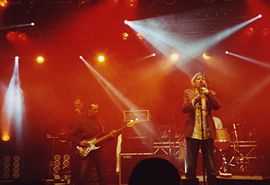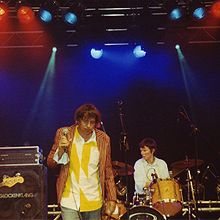Wrong colors
| Wrong colors | |
|---|---|
 Wrong colors 2006 |
|
| General information | |
| origin | Düsseldorf and Wuppertal , Germany |
| Genre (s) | Post-Punk , New Wave , Punk , Neue Deutsche Welle |
| founding | 1979, 1989 |
| resolution | 1984 |
| Website | www.fehlfarben.com |
| Current occupation | |
singing |
Peter Hein (until 1981, since 1989) |
guitar |
Thomas Schneider (since 2014) |
bass |
Michael Kemner (until 1981, since 1989) |
Keyboard, saxophone, percussion |
Frank window maker |
Keyboard, synthesizer |
Kurt Dahlke |
Drums |
Saskia von Klitzing (since 2000) |
| former members | |
Guitar, vocals |
Thomas Schwebel (until 2008) |
Drums |
Uwe Bauer (until 1991) |
bass |
Xaõ Seffcheque (1982) |
bass |
Hans Maahn (1982-1983) |
bass |
Hellmut Hattler (1984) |
Drums |
Martin Schwebel (1984) |
Drums |
Markus Oehlen (1979) |
guitar |
Uwe Jahnke (1981-2014) |
Fehlfarben is a German-language rock band from Düsseldorf and Wuppertal that was founded in 1979 during a performance by The Teardrop Explodes in London.
The founding members were Peter Hein (formerly lunch break ), Thomas Schwebel (formerly lunch break, SYPH ), Michael Kemner (formerly YOU , DAF , later Mau Mau , 20 Colors), Frank Fenstermacher (later Der Plan ), Uwe Bauer (formerly Materialschlacht) and Markus Oehlen (formerly lunch break).
history
Fehlfarben is the successor to the punk band Mittagspause, which in turn was the successor to the original punk band Charley's Girls . Both groups played experimental music before the decision was made to re-bundle the forces of the scene around the Ratinger Hof in Düsseldorf for a more professional music project.
The band idea and the name Fehlfarben came up during a vacation in England, during which some members were infected by the local ski fever . The first single, Abenteuer & Freiheit, was still very scalable. However, the group soon gave up the Skasound, and with the conclusion of a record deal with the major company EMI , the Fehlfarben broke away from the status of an underground band.
The members from the punk scene , some of whom belong to the very first generation, were from then on referred to as "punk traitors", which is why there was also a change of audience. The band was also clearly criticized from the scene and reviled by other groups: z. B. from the group Rotzkotz with the song Tante EMI (also based on their own bad experiences) , in which "Fehl-Musik" is mentioned and "Weltrekord" (the EMI label of Fehlfarben) is equated with "money record." ".
In 1980 the debut album Monarchy and Everyday Life was released , which achieved immense importance in the German-speaking rock scene of the time. Many pieces on the album were clearly punk-heavy, however, faster than the songs from the lunch break. In 2000, 20 years after its release, the album achieved the necessary sales for a gold record .
On the occasion of the 20th anniversary, an Edition 2000 was released, which also contained the earlier single and live tracks. Through the personal connection to the group DAF (through bassist Michael Kemner and Kurt Dahlke alias "Pyrolator") the song Kebabträume was released on both sides on the album, which also achieved cult status.
The only big hit of the Fehlfarben (Top 30 in Germany) was the song Ein Jahr (It goes ahead) , which was influenced by the funk style . To their chagrin, the song , which is atypical for the band and driven by an adapted chic riff, is perceived by the public as their most important work. It was released as a single against the will of the band in 1982, when Neue Deutsche Welle (NDW) was at its commercial peak - two years after it was first released on the album Monarchie und everyday . The squatter scene identified with this piece, so that it is often referred to as the "squatter anthem", which was not wanted by the band. Peter Hein himself spoke out in several conversations against the appropriation as a "squatter band" and clay-stone-shard- successors, probably because the attitude of the wrong colors was and is in part socially critical, the intention in one year (It goes ahead ) but was completely different.
Shortly after the release of his debut, Peter Hein left the band because he had to choose between band and career. Until 2003 he was employed by Xerox . The band released two more albums in the eighties without Hein ( 33 Tage in Ketten , Glut und Asche ), on which guitarist Thomas Schwebel took over the vocal part. Both albums were able to enter the charts. After quarreling with the label, the band broke up at the end of 1984.
There was a first revival in the original line-up (including Peter Hein) at the beginning of the 1990s, two albums recorded in two different ways ( Die Platte des himmlischen Friedens , Live ) and the previously unreleased album Popmusik und Hundezucht (1995) , which was recorded in 1984 without Hein .
It was not until 2002 that a new sign of life for the false colors appeared with knee deep in the dispo . It coincided with a small NDW revival that was triggered by the successful documentary novel Verschwende Deine Jugend . As a result, interest in the former German-speaking punk and new wave beginnings increased again, but according to Hein the sales figures for the record company at the time still fell short of expectations.
In 2006 the anniversary album 26½ was released, on which celebrities and friends z. Some of the group covered pieces of Fehlfarben's instrumental performance. Participants included Campino , Herbert Grönemeyer , Helge Schneider , Jochen Distelmeyer , Dirk von Lowtzow , Peter Lohmeyer , Bernd Begemann and Sven Regener . The album Handbuch für die Welt was released on April 20, 2007 . At the beginning of 2008 Thomas Schwebel left the band. The album Glücksmaschinen was released on February 12, 2010 . The album Xenophonie was released on May 26, 2012 . A tour through Germany and Austria follows in September 2012.
Active members
In addition to Hein, Kemner and Fenstermacher, Thomas Schneider ( Cryssis , Beatlessons, Skuyela), Saskia von Klitzing (formerly Bones and Gry , Carpathian Dog and still Locas in Love ) and Kurt "Pyrolator" Dahlke (formerly DAF, The Plan) with.
Discography
|
Chart positions Explanation of the data |
||||||||||||||||||||||||||||||||||||||||||||||||||||||||||||||||||||||||||||||||||||||||||||||||
| Albums | ||||||||||||||||||||||||||||||||||||||||||||||||||||||||||||||||||||||||||||||||||||||||||||||||
|
||||||||||||||||||||||||||||||||||||||||||||||||||||||||||||||||||||||||||||||||||||||||||||||||
| Singles | ||||||||||||||||||||||||||||||||||||||||||||||||||||||||||||||||||||||||||||||||||||||||||||||||
|
||||||||||||||||||||||||||||||||||||||||||||||||||||||||||||||||||||||||||||||||||||||||||||||||
Albums
- 1980: monarchy and everyday life
- 1981: 33 days in chains
- 1983: embers and ashes
- 1991: The Plate of Heavenly Peace (with Helge Schneider )
- 1992: Live
- 1994: Pop music and dog breeding (recorded 1984)
- 1998: Moving On ( Compilation )
- 2002: knee-deep in the dispo
- 2006: 26½ (with guests: Helge Schneider , Campino , Herbert Grönemeyer , TV Smith and others) (V2 Records)
- 2007: Handbuch für die Welt (V2 Records)
- 2009: Live here & now (Ata Tak)
- 2010: Lucky Machines ( Wallpaper Records )
- 2012: Xenophonie (Wallpaper Records)
- 2015: About ... People (Wallpaper Records)
Singles
- 1979: Adventure & Freedom / Great Love
- 1981: The word is out / what ?!
- 1982: one year (moving forward)
- 1982: 14 days / fire on board
- 1983: day and night
- 1983: Agents in smoking cinemas
- 1985: Not a quiet minute / Heaven is crying
- 1991: In times like these
- 2002: Beautiful Mothers Club
- 2003: alcohols
- 2010: We are waiting (you have the clock, we have the time)
- 2012: place there!
Contributions to compilations
- 2003: Not again on Rio Reiser - family album - a homage
- 2006: We do like you, play loud! on Silver Monk Time - A Tribute to the Monks
- 2009: More Giving To The Fantastic Four - A Tribute To
- 2014: Justice on Poem - Leonard Cohen in German
Music videos
- 2002: Club of beautiful mothers (Düsseldorf, with Charlotte Roche )
- 2003: Alcohols (Düsseldorf)
- 2006: Surgery 2010 (awarded the MuVi Online Audience Award 2006)
- 2007: political disco
- 2009: WWW (live from the sack factory, Magdeburg)
- 2009: Handbuch für die Welt (live from the sack factory, Magdeburg)
- 2010: happiness machines
- 2012: place there!
literature
- Jürgen Teipel: Waste your youth . Suhrkamp 2001, ISBN 3-518-39771-0 .
- Rüdiger Esch: Electri_City. Electronic music from Düsseldorf 1970–1986 , Suhrkamp , Berlin 2014, ISBN 978-3-51846464-9 .
- Sven-André Dreyer , Michael Wenzel, Thomas Stelzmann: No breathing space - Music from Düsseldorf , Droste, Düsseldorf 2018, 192 pages, ISBN 978-3-7700-2067-6 .
Web links
- Official website
- Wrong colors at laut.de
- Testament of the bad mood attack on the present Tagesspiegel April 17, 2007
- “Use your youth” , review / interview on “26½” in Tagesspiegel , February 22, 2006
- Fehlfarben at Discogs (English)





